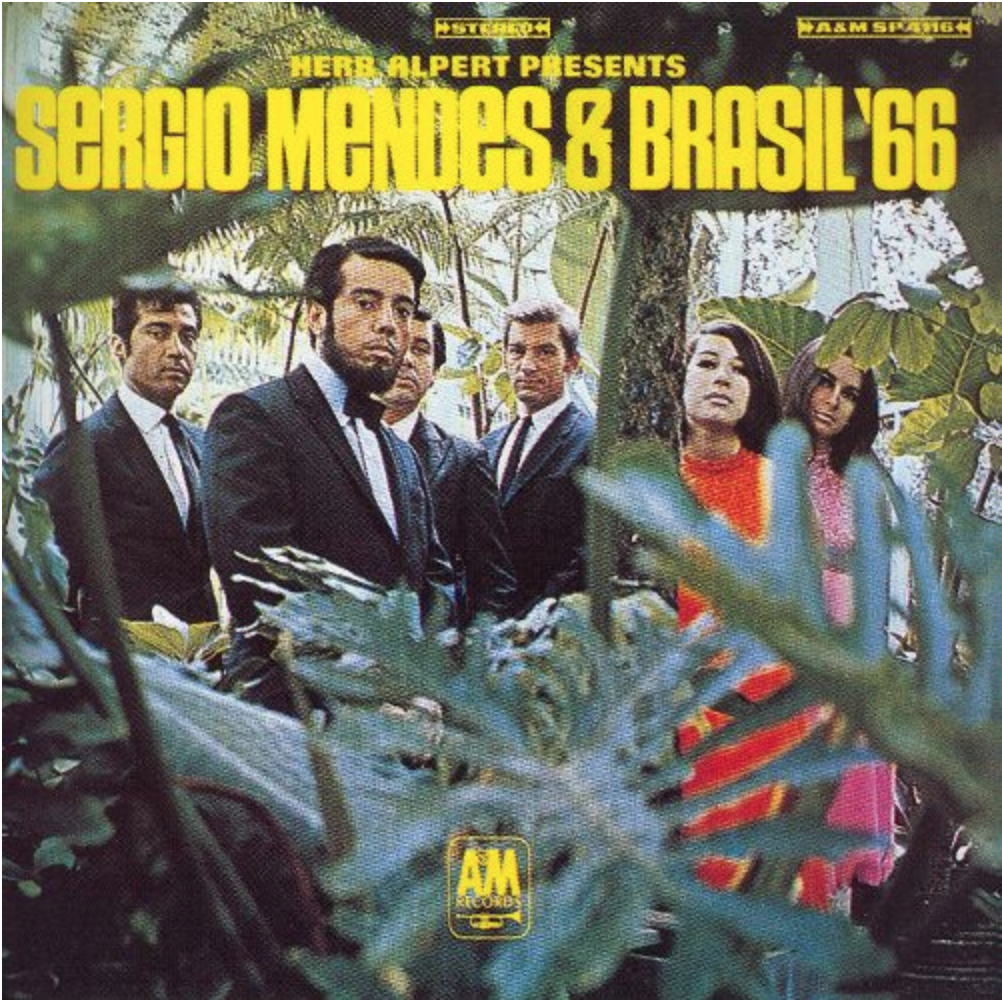In 1966, the U.S. was transformed by many significant events. Beatlemania, Vietnam protests, the influential Miranda case, and the birth of both Adam Sandler and Mike Tyson all came in this year. So too came an album which has profoundly impacted me. Herb Alpert Presents: Sergio Mendes and Brazil ‘66 was born in this year, and with it ten fun, harmonious, and energetic tracks created an infectious cultural bridge between the United States and Brazil.
Perhaps these two nations had more in common than people would imagine. In 1966, both countries were in deep political water, and popular music was becoming more experimental as subject matter was shifting. Both nations were reckoning with a brutal history of slavery and oppression, where the Black Movement in Brazil had strong parallels to the American Civil Rights movement (though there were also stark differences). There was a mood of angst and uncertainty, and a growing music industry in both nations was poised to take on a new role in popular culture.
Herb Alpert was an American musician and record producer with a keen ear for Latin-beat. Sergio Mendes was a former Brazilian Big-Band star who created showtunes in the late 50’s and early 60’s that are universally recognized today. The sound that he was building in with ‘66 was fun and new, and Alpert recognized this. He signed Mendes to A&M, and a great partnership was born, as well as an important cultural exchange.
Mendes plays everything from Brazilian standards to fresh takes on Beatles songs and Little Anthony tunes on this album, and skillfully blends them all into an upbeat, tightly knit, and distinctly Brazilian style. Backup harmonies, warm piano strokes, and the smooth vocals of lead singer Gracinha Leporace (Mendes’s wife) created a sound unlike any other gracing the ears of Americans.
I am blessed to know all four of my grandparents, who were avid music fans in the 60’s. They all fondly remember Sergio Mendes and his music, because it was such a stark departure from other records that were popular at the time.
Although the Beach Boys, Simon and Garfunkel, and the Beatles all had beautiful harmonies that were populating the airwaves in 1966, the creative use of percussion through four musicians on this album separated Sergio Mendes from the rest.
This record was part of a larger cultural phenomena at the time, the so-called ‘Samba Craze’, which put “The Girl From Ipanema” on the charts and brought artists like Stan Getz, Charlie Byrd, Lalo Schefin, and even Quincy Jones popularity with their Brazilian sounds.
The music sounded like a summer breeze and ocean waves, and it was a fantastic distraction from the turmoil that was overtaking the nation.
The cultural exchange was mutual. American artists topped Brazilian charts, and a wider American audience for artists like Joao Gilberto meant more financial stability and well deserved respect for their music.
Yet, this was not to last forever.
As artists like Bob Dylan, Sly Stone, Jimi Hendrix, and the Rolling Stones became mainstays in American culture, the happy-go-lucky sounds of super Samba were out of fashion, and the craze was over.
Brazil saw its own revolution as Tropicala was born and artists like Os Mutantes became the spokespeople for an increasingly tumultuous nation.
Yet Sergio Mendes continued creating records, covering Beatles tunes, and making the magic happen with his incredible harmonies and tight percussive arrangements.
In the decades that followed this disconnect, Americans would come to rediscover the unparalleled greatness of Brazillian artists like Tim Maia, Joao Donato, Gilberto Gil, Jorge Ben Jor, Marcos Valle, and Seu Jorge.
A dedicated sector of the American populace has remained loyal to the Brazilian music industry long since Sergio Mendes’s epic self-titled album, but it is never a bad time to dive into this record and celebrate its infectious optimism.
Standout tracks:
“One Note Samba”
“O Pato”
“Day Tripper”
“Berimbau”

By Jacob Newman

